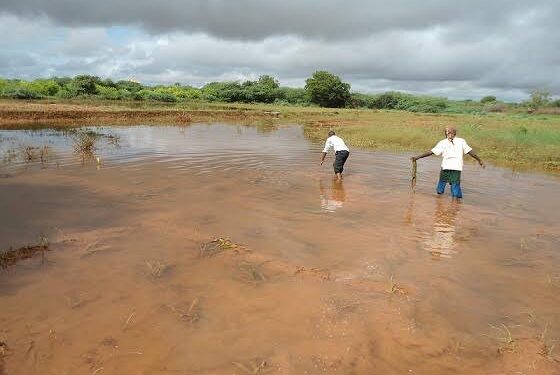
Yusuf Macalin Noor, a farmer in southern Somalia’s Lower Shabelle region, has an empty food store on his homestead after recent river floods took their toll in a series of climate disasters he has suffered.
He had picked up his farming tools towards the end of April when welcome rainfall started in his area of Wanlaweyn district after prolonged drought. But after spending hours labouring in the fields, everything was wiped by unexpected flooding of the river Shabelle on 25 June.
The last time he had planted was in 2021, but swarms of locusts descended on his farm and ate all the crops before he could harvest.
“This year I thought would be better. I was planning to store food for the next three to four years, but now the flood water has come,” Yusuf said.
“We thank God still, although for five years we haven’t had anything from our farm. We were planning to reap our produce mid next month [August]. We were already starting to reap our beans when the floods came.”
Yusuf was growing corn, beans, sesame, and sorghum on his eight-hectare farm, 15 kilometres east of Wanlaweyn town, and had invested $500 in buying seeds. He is now struggling to make ends meet for his large family of three wives and 17 children.
His family has already built up loans of $350 from local stores for food. His three older sons have been unable to support their wives and children, as they also depended on the farm and its produce.
The family has abandoned the farm and moved to higher ground.
“We left the farmland flooded. It is not close at all. You can see how it’s affected my children’s families. The hope I have now is that the water dries up and we take more loans to prepare the land. This time we will have to plant sesame or maize, that is my hope. We don’t know how to work in the cities because farming is all we know, and now our hope is in God,” Yusuf said.
Many farmers in this area have been counting similar losses after the floods and have similarly had their hopes dashed after such a long run of disasters.
Abdifatah Abukar Maanow in Buraley village, eight kilometres from Wanlaweyn, said he received a warning from other farmers that river water was flooding over the farmland and his land would be next.
He decided to allow livestock herders without any charge to graze their animals on the unripe crops before the floods came. The little left by the livestock was indeed washed away by floodwaters.
Farming is the family’s only source of income in this remote area in Lower Shabelle. Abdifatah had taken a loan of 10 million Somali shillings ($340) and invested it all in his farm hoping to pay it back when he sold the anticipated produce.
“We are poor people, you know, and we depend on those fields and animals. We invested money in our farms and we used our hands to work on them. We have taken loans and we need to pay them,” he said.
The affected families have fled the farms submerged by the river floods and are now camped on higher ground in Wanlaweyn. Abdifatah said he is empty-handed and unable to afford food.
The Wanlaweyn administration assessed the flood damage and reported that about 2,000 farmers have been affected by the floods.
The commissioner of Wanlaweyn District, Abdihakim Abdullahi Sheikh, told Radio Ergo that they have no capacity to control flooding of the river.
He pointed out that they have shared their reports with the Somali government and the South West state administration, asking for people to be helped.
“The water comes from the Shabelle river and it flows from Hiran side. Repairs of the river banks used to be done every three years but they weren’t done this year. The flooding has affected many villages, we are still conducting surveys and we try to do what we can but the water is still flowing,” he said.
The commissioner said people are still worried about the floods that further flooding will wreak more havoc as families are desperately trying to recover from the long drought and water shortage.
Local families normally store their farm crops in underground stores and use the food through dry seasons. This time the stores are empty because of the flood damage. Most people living in Lower Shabelle region depend on agricultural production and animal husbandry for a living. Successive climate-related shocks have sabotaged their livelihoods.
Source: Radio Ergo


